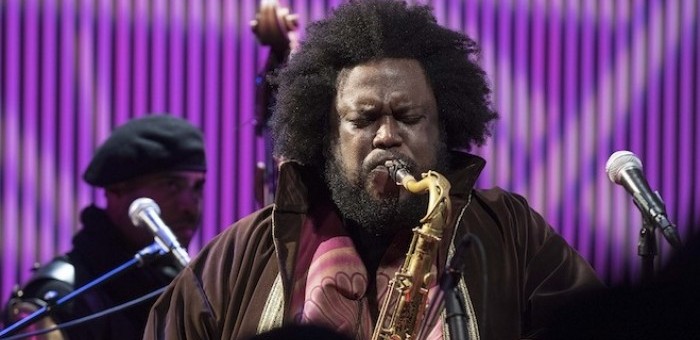Jan 13, 2026 2:09 PM
More Trump-Kennedy Center Cancellations
The fallout from the renaming of the John F. Kennedy Center for the Performing Arts to include President Donald…

Kamasi Washington (foreground) and bassist Miles Mosely perform at SFJAZZ Center in San Francisco on Jan. 8.
(Photo: Ronald Davis)Though Kamasi Washington is a proud native of South Central Los Angeles, the popular tenor saxophonist has a significant gig history with the San Francisco Bay Area. He and his bandmates played both the largest outdoor and highest capacity indoor stages at San José Jazz Summer Fest 2015—a year before they’d play such huge gatherings such as the Coachella Valley Music and Arts Festival in southern California, the Bonnaroo Music Festival in Tennessee and the Pitchfork Music Festival in Chicago.
Prior to making that festival run, he and his West Coast Get Down crew played two long sold-out shows for the San Francisco-based Noise Pop Festival. (Those reportedly packed sets took place over a late February night last year at The Independent, the rock and hip-hop venue where Esperanza Spalding’s Emily’s D+Evolution project made its club debut in 2015.)
After playing New Year’s Eve at the famed Brooklyn Bowl, Washington’s The Next Step octet jetted across the country for a residency at the SFJAZZ Center, where they headlined five shows on Jan. 6–8. At the closing night performance, what stood out was how much the group was a communal entity, albeit one under Washington’s charming leadership.
The open dance floor was crowded (but not uncomfortably so) and the patrons were noticeably diverse and multi-generational, with the younger segment of the audience joyfully expressing its approval throughout the 100-minute event.
With a pair of drum kits placed on risers symmetrically situated toward the rear of the bandstand and a vertical design projected to its back walls, the night had a slightly bigger feel than the usual fare presented at the venue. After some warm introductory comments from Washington, drummer Ronald Bruner Jr. commenced with an unaccompanied military-like rhythm.
Soon joined by keyboardist Brandon Coleman and double bassist Miles Mosely, the rhythm section established an electric mood for Washington, trombonist Ryan Porter and drummer Tony Austin to further pad the opening number with dense harmonies. Vocalist Patrice Quinn’s atmospheric wordless singing and drummer Tony Austin’s complementary playing filled out the piece.
When two drummers play in the same group, there may be a tendency switch off between traditional drum and percussion roles. Austin and Bruner were both independent yet interlocked, which was particularly effective when they were supporting—and enthusiastically encouraging—solos.
Flutist Ricky Washington, Kamasi’s father, came onstage prior to the second number, “Askim,” which is also the second track on Washington’s Brainfeeder opus The Epic (winner of the Jazz Album category in the 2016 DownBeat Critics Poll). The tenor saxophone, trombone and flute or soprano sax instrumentation provided a solid front line for the collective’s brand of politically conscious jazz.
Washington’s stage banter, punctuated with healthy doses of humor, focused on the back-stories of his band members and music. He explained that “Black Man” was collaboration between Quinn and Coleman. The charismatic Quinn alternated between speaking and soulfully singing the socially aware lyrics.
Mosley has a solo album, Uprising (Alpha Pup/World Galaxy), due out Jan. 27, as Washington later announced. Mosley’s tune “Abraham,” in which his powerful singing was on full display, featured a funky bridge and a dynamic call-and-response with the energized crowd.
Reminiscent of Bay Area icons the Grateful Dead’s “Drums/Space” live segments, Austin and Bruner then got a “drummers only” showcase during which they played together and also individually.
By the end, the band was splicing genres within the same number and giving old and newfound fans a peak into their influences by going from electric fusion to straightahead jazz with a spry walking bassline to hard disco driven by Coleman’s analog-sounding Moog keyboard-driven low end. The quote from “It’s A Hard Knock Life”—from the musical Annie as heard on Jay-Z’s 1998 hit “Hard Knock Life (Ghetto Anthem)”—was clearly a shared touchstone for those on the stage and those in the audience.
Washington will perform at the Rialto Theatre in Tucson, Arizona, on Jan. 12 and at Campbell Hall in Santa Barbara, California, on Feb. 16. For more tour dates, visit his website. DB

Belá Fleck during an interview with Fredrika Whitfield on CNN.
Jan 13, 2026 2:09 PM
The fallout from the renaming of the John F. Kennedy Center for the Performing Arts to include President Donald…

Peplowski first came to prominence in legacy swing bands, including the final iteration of the Benny Goodman Orchestra, before beginning a solo career in the late 1980s.
Feb 3, 2026 12:10 AM
Ken Peplowski, a clarinetist and tenor saxophonist who straddled the worlds of traditional and modern jazz, died Feb. 2…

The success of Oregon’s first album, 1971’s Music Of Another Present Era, allowed Towner to establish a solo career.
Jan 19, 2026 5:02 PM
Ralph Towner, a guitarist and composer who blended multiple genres, including jazz — and throughout them all remained…

Rico’s Anti-Microbial Instrument Swab
Jan 19, 2026 2:48 PM
With this year’s NAMM Show right around the corner, we can look forward to plenty of new and innovative instruments…

Richie Beirach was particularly renowned for his approach to chromatic harmony, which he used to improvise reharmonizations of originals and standards.
Jan 27, 2026 11:19 AM
Richie Beirach, a pianist and composer who channeled a knowledge of modern classical music into his jazz practice,…